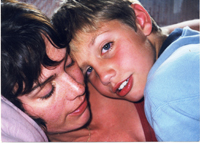Boy Interrupted is a film that raises questions. It asks how a young boy can end his life at the tender age of 15. It struggles to find answers about what kind of family he had and the life he led. By its very nature, it is a naked display of its filmmaker’s personal life at its most revealing and perhaps disturbing. How can a mother, we may ask, make a film about the death of her son?
What defines this film as a remarkably unique and truth-telling achievement is the way it explores how filmmaking can create closure for its creators as well as its audience. Dana Perry has gathered home movies, photographs, and a variety of different documents to tell the story of her son, Evan: his bipolar illness, his life, and his death, and their impact on those who loved him the most. She interviews his siblings and friends, his doctors and his teachers, and in the process, she chronicles a harrowing and difficult journey.
The camera provides insight and revelation, and yet Boy Interrupted is a film that is also full of despair. The film’s saving grace is that it functions, in the final analysis, as therapy for both its viewers and its subjects at a most fundamental level. It is an essentially human story, and a parent’s worst nightmare.


